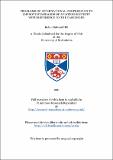Files in this item
Problems of international cooperation to improve standards of aviation security with reference to the passenger
Item metadata
| dc.contributor.advisor | Wilkinson, Paul A. | |
| dc.contributor.author | Hill, Robin Edward | |
| dc.coverage.spatial | 319 p. | en_US |
| dc.date.accessioned | 2018-07-10T09:51:58Z | |
| dc.date.available | 2018-07-10T09:51:58Z | |
| dc.date.issued | 1991 | |
| dc.identifier.uri | https://hdl.handle.net/10023/15165 | |
| dc.description.abstract | Crimes of violence involving civil aviation interests and airline passengers have developed and diversified since their original perpetration in the 1930s. Intergovernmental cooperative efforts to suppress the offences have largely been based upon international legal, administrative activities, with the intention of producing a near-global, standardised regime of norms concerning the apprehension, extradition, prosecution and punishment of persons responsible for acts of aviation hijacking, sabotage and airport attack. While the suppressive dualities of the regime have been demonstrated in terms of common air crimes, the internationally recognised norms have had little effect in countering the act ions of fanatical offenders motivated by political aims. While concentrating upon law-based policy options premised on the notion of deterrence, governments have failed fully to recognise a pressing need for preventive activities to be improved as a principal component of crime suppression machinery. With terrorist weaponry and abilities becoming increasingly sophisticated, with most available aviation security staff and apparatus being unreliable in processes of detection and with the civil aviation market expanding rapidly, imprecise and unenforced state-imposed standards of aviation security require radical and global upgrading - an expensive and politically difficult option for most governments to consider. Proposals for intergovernmental security development schemes need urgent consideration, with passenger-financed options offering some practical solutions to otherwise potentially insoluble problems. Ultimately, prospects of advancement must depend upon the political will of major governments, which continue to regard the integrity of aviation security systems as a low priority for global standardisation. | en_US |
| dc.language.iso | en | en_US |
| dc.publisher | University of St Andrews | |
| dc.subject.lcc | HV6431.A8H5 | |
| dc.subject.lcsh | Terrorism | en |
| dc.title | Problems of international cooperation to improve standards of aviation security with reference to the passenger | en_US |
| dc.type | Thesis | en_US |
| dc.contributor.sponsor | International Foundation of Airlines Passengers Associations (IFAPA) | en_US |
| dc.type.qualificationlevel | Doctoral | en_US |
| dc.type.qualificationname | PhD Doctor of Philosophy | en_US |
| dc.publisher.institution | The University of St Andrews | en_US |
This item appears in the following Collection(s)
Items in the St Andrews Research Repository are protected by copyright, with all rights reserved, unless otherwise indicated.

